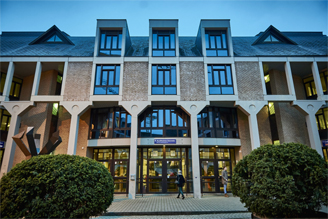Bringing academia and intergovernmental organizations closer together
NATO Headquarters and UCL sign a cooperation agreement in the field of translation
Who among us hasn’t heard young people talking about how tough the first steps in their career were? Translators are no different in that regard. Sometimes they allude to the gap between what they learned at university and what they experience in their job on a day-to-day basis: the pace of work in a professional setting; the necessity of snap decisions on the best translation; the need to compromise in order to meet deadlines, when students can take as much time as they need to hone their thesis; and so on.

The start of 2018 saw an important meeting between the academic world and the world of intergovernmental organizations. Université catholique de Louvain (UCL), home to the Louvain School of Translation and Interpreting (LSTI, formerly known as Institut libre Marie Haps), and the Headquarters of the North Atlantic Treaty Organization, represented by its Translation Service, have just signed a cooperation agreement that covers terminology discussions, presentations and workshops by NATO translators at UCL, and greater cooperation on recruitment.

“Signing this agreement with NATO supports one of my priorities as Dean: to develop a closer relationship between the courses offered by the Faculty of Philosophy, Arts and Humanities – which include the master’s degrees in translation and interpretation – and the business world in the broad sense and the world of international organizations such as NATO. The aim of this relationship is not to produce made-to-order, work-ready graduates, but rather to familiarize students well before they enter the job market with the expectations and requirements of international organizations and businesses. I expect that this agreement with NATO will be met with enthusiasm from the translation and interpretation students, and will contribute to a higher quality of education,” underscored Professor Philippe Hiligsmann, Dean of the Faculty of Philosophy, Arts and Humanities.
“We sought out this closer relationship with a prestigious university such as UCL because we established that francophone translators were not necessarily aware that NATO is a bilingual organization with an in-house translation team at its Headquarters. We see it as an opportunity to better inform students about our work and to help them prepare themselves for our recruitment competitions,” said the representative for NATO Headquarters, Raphaël Prono.
The initiative is bound to be enthusiastically received by UCL translation students, who already have the opportunity to get a real-life introduction to professional translation work through an internship as part of their studies. It offers a chance to get guidance from professionals accustomed to translating not only joint statements by the Heads of State and Government of the 29 NATO countries but also complex technical documents. For the NATO translation team, the aim is clear: to find new talent that will flourish in a service that seeks excellence, in a friendly atmosphere of mutual assistance.
